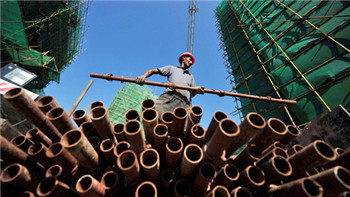(单词翻译:单击)

The manufacturing purchasing managers’ index published by the National Bureau of Statistics fell to 49.9 in June, below the 50-point line delineating growth from contraction for the first time in four months. That was just a hair below a consensus forecast from economists of 50 that would have meant activity neither rose nor fell compared to the previous month.
据中国国家统计局(NBS)公布数据,7月制造业采购经理指数(PMI)降至49.9,四个月来首次落于荣枯线以下。该数据微微低于经济学家此前预计的50(意味着制造业活动较上一月既没有上升也没下降)。
In an explanatory note the bureau suggested the primary factor behind the fall was a particularly strong El Nino effect, pointing to heavy rains and flooding in most of China’s provinces, particularly those along the Yangtze River Basin, which had impacted production (down 0.4 percentage points to 52.1) and transportation, among other things. But it also acknowledged a marked backslide in market demand.
中国国家统计局在数据解读中表示,本月回落主要原因是受超强厄尔尼诺现象影响,中国大部分地区,特别是长江流域遭遇强降雨及洪涝灾害,生产及运输等受到影响,本月生产指数回落0.4个百分点,至52.1。但该机构也承认市场需求明显放缓。
Economic stimulus continued to chiefly benefit large-scale enterprises, where PMI came in at 51.2, up 0.2 percentage points from June. Mid-sized and smaller enterprises both saw activity contract more severely with readings of 48.9 and 46.9 for the period respectively.
经济刺激政策的受益者仍主要为大型企业,其PMI指数为51.2,比6月份上升0.2个百分点;中、小型企业PMI指数分别为48.9和46.9,显示其活动收缩加重。
The official non-manufacturing PMI, which covers services but also includes some old-growth industries such as construction, came in at 53.9 in June, climbing further above the 50-point line.
7月官方非制造业PMI为53.9,在荣枯线之上进一步攀升。非制造业PMI不仅涵盖服务业,还包括建筑业等一些传统增长行业。
A sub-index for business activity in the services industry rose 0.4 percentage points from June to 52.6, which the bureau attributed to marked growth in rail and air logistics, telecommunications, information and technology, foreign exchange finance, capital market services, and leasing and business services.
服务业商务活动指数比6月上升0.4个百分点,达到52.6,中国国家统计局认为这是由于铁路和航空物流、电信、信息和技术、外汇融资、资本市场服务以及租赁商业服务的显著增长所致。
But non-manufacturing employment dropped another 0.2 percentage points to 48.5, indicating more job shedding. And China’s construction industry appeared to decelerate after revving up substantially in months prior, as a sub-index for the sector dropped to 61.1 in July, a marked fall from June’s reading of 62.
但非制造业就业人数又下降了0.2个百分点至48.5,表明用工量继续减少。中国的建筑行业在经过此前几个月的大幅加速后也出现减速,7月建筑业商务活动指数降至61.1,相较6月份的62有明显下降。
The official figures suggested things were grim for China’s manufacturing sector, but the latest edition of an independent activity gauge for the sector suggests they may be improving.
官方数据显示中国制造业状况严峻,但根据独立调研机构财新(Caixin)最新发布的数据,中国制造业可能有所提高。
The Caixin-Markit manufacturing purchasing managers’ index for July rose above the 50-point mark separating growth from contraction with a reading of 50.6, up from 48.6 in June.
财新7月份PMI比6月份高了2个百分点,升至50.6,来到荣枯线上方。
The return to growth for the gauge, marking its highest reading since February 2015, comes as its official counterpart published by China’s National Bureau of Statistics has finally slipped into contraction after four months of respite.
这是财新PMI自2015年2月以来达到的最高水平,标志中国制造业恢复增长,但与国家统计局公布的数据出现背离。
The survey also showed output, buying activity and new orders all returned to growth as well, while a fall in new export orders suggested that growing demand was primarily domestic. However, companies surveyed said they had cut jobs in July for a fifth month running, if at a marginally slower rate.
财新的调查研究还表明产出、购买活动以及新订单都恢复增长,但新出口订单出现下降,这表明需求提高主要来自国内。不过受调查公司表示他们在7月份继续裁员,这已是连续第五个月用工量收缩,虽然收缩速度略微放缓。


